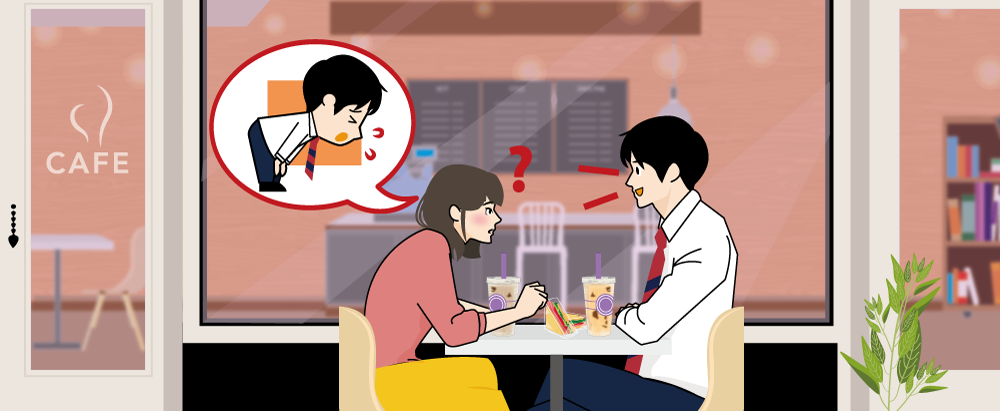Today's Point
今日のポイント
ほめられても否定したり、お客さまを自宅に招待するときに「狭い家でごめんなさい」と謝ったり、日本には外国の人たちには不思議な風習が他にもたくさんあります。
これらは全て日本人の「謙遜」の表れですよね。
でも、ジウには「そんなに礼儀正しくしてたら大変では?」と感じるようです。

Story of the Day
今日のストーリーRepeat after your teacher.
先生の後に続けて言ってみましょう。
| Jiu : What are some other unusual Japanese customs? | ジウ : 他にも珍しい日本の風習ってあるの? |
|---|---|
| Ken : Well, for example, if someone compliments you, you should deny it. | ケン : そうだな、たとえば誰かにほめられたら否定(謙遜)するとか。 |
| Jiu : Really? | ジウ : まじで? |
| Ken : Also, when we welcome guests to the house, we apologize for having a small house. | ケン : あと、家にお客を呼ぶときに、狭い家でごめんなさいと謝ったりするんだよ。 |
| Jiu : I don't understand Japanese people. | ジウ : 日本人の気持ちがわからないわ。 |
| Ken : You might say we’re too modest. | ケン : 謙虚過ぎるってことかなぁ。 |
| Jiu : Isn’t it hard to be so polite all the time? | ジウ : いつもそんなに礼儀正しくしてたら大変じゃない? |
| Ken : Not really. | ケン : そうでもないんだ。 |
| Ken : It’s just part of the culture. | ケン : もはや文化の一部だからね。 |
| Ken : Don’t you have customs like this in Korea? | ケン : 韓国ではそんな風習ないの? |
| Jiu : I suppose we do. | ジウ : たぶんあると思うけど。 |
Key Phrase
キーフレーズRepeat after your teacher.
先生の後に続けて言ってみましょう。
Isn’t it hard to be so polite all the time?
Vocabulary / Expressions
ボキャブラリーと表現Repeat after your teacher.
先生の後に続けて言ってみましょう。
| unusual (形容詞) | 珍しい |
|---|---|
| compliment (動詞) | 褒める |
| deny (動詞) | 否定する |
| modest (形容詞) | 謙遜した |
| polite (形容詞) | 礼儀正しい |
Exercise
エクササイズ ARead the conversation aloud with your teacher. Fill in the blanks with a, b and c.
After that, fill in the blanks with your own words and practice the conversation with your teacher.
下記の会話の空欄に、a, b, cそれぞれの言葉を入れて、先生と一緒に音読してみましょう。
そのあと、空欄に入る言葉を自分で考えて、先生と会話をしてみましょう。

| Jiu : Isn’t it hard to be ________ (a. Japanese b. modest c. right) all the time? | ジウ : いつも(a. 日本人であるという b. 謙虚でいる c. 正しくあるという)のは大変じゃない? |
|---|---|
| Ken : Not really. | ケン : そうでもないんだ。 |
| Ken : It’s just part of the culture. Don't ________ (a. you know similar customs b. you enjoy these kinds of differences c. Koreans act like this)? | ケン : もはや文化の一部だからね。(a. 似たような習慣を知ら b. こういった違いは面白く c. 韓国人もこんな感じで振舞わ)ない? |
| Jiu : I’m not sure. | ジウ : よくわからないわ。 |
Exercise
エクササイズ B (Vocabulary Building)Choose the correct word from the box.
空欄に当てはまる言葉を選んで文章を完成させてください。
- unusual
- compliment
- deny
- modest
- polite
- This is an ________ pencil. It's so long.
- Don't be so ________. Tell me about your trophies.
- Let's try to ________ each other more.
- If you didn't do it, ________ it.
- You should be ________ to older people.
Exercise
エクササイズ CSituation : It's 6:30 and your colleague is still working. She was going to a party from 6:00. Talk to her.
ロールプレイ : 今6時半で、あなたの同僚はまだ働いています。その同僚は6時からのパーティーへ行く予定がありました。その同僚に何か声をかけてください。


Extra Exercise
Try the Extra Exercises. As with Exercise A, become familiar with some of these more advanced phrases.
エクストラ・エクササイズに挑戦してみましょう。
エクササイズAと同じ要領で、より高度なフレーズを練習してみましょう。
Isn’t it hard to be so polite all the time?
| Ken: I have to go to Immigration today. |
|---|
| Ken: There’s something wrong with my visa application. |
| Jiu: Can’t you (a. do it by phone b. ask your company to handle it c. do it next week)? |
| Ken: I’m afraid not. |
| Ken: Wouldn’t it be great if (a. we had permanent visas b. we didn’t have to worry about this c. we could just travel to other countries freely)? |
| Jiu: Maybe in a perfect world. |

- in a perfect worldは「現実にはあり得ない完璧な世界では→理想的な世界ではという意味です。
- 似たような表現に、in your dreamsがあります。直訳は「あなたの夢の中では」ですが、信じられないような話を聞いたときなどに「嘘でしょ!」「ありえない!」「無理でしょう!」のような意味で使います。 例えば、I think he’ll propose to me this year.「彼が今年プロポーズをすると思うのよ」-In your dreams! He doesn’t even know you. 「ありえない!彼はあなたのこと知らないじゃない」 のようになります。 ユーモラスな表現ですが、相手をちょっと小ばかにしたようなニュアンスを伴う場合があるので、使い方には注意しましょう。